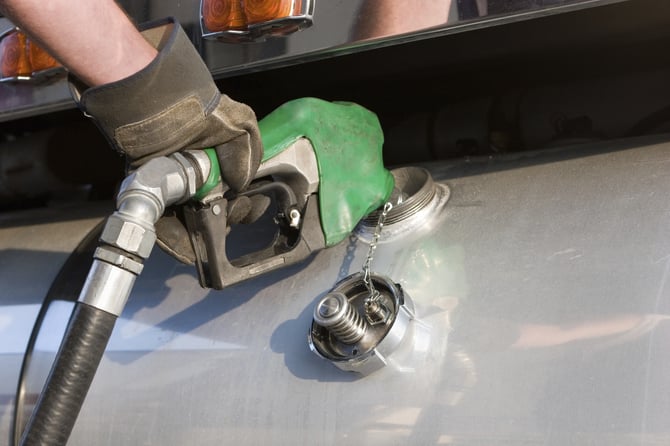Fuel, maintenance/repair, and insurance costs are expenses that every fleet incurs. The fleet that manages these costs the most efficiently has a competitive advantage and will enjoy greater earnings. The following are three fleet tracking tips on how to increase fleet efficiency and profit.
1. Fuel Costs

Fuel is the largest operating expense for fleets. Taking tight control of this expense can bring about significant economic benefits. GPS fleet tracking systems offer huge advantages to fleet managers, as they make fuel purchases, as well as fuel use, much more transparent. With GPS tracking, managers are able to view when and where fuel purchases are made, and by whom. They can view reports that systematically display cost-per-mile, as well as miles-per-gallon. There are numerous fuel purchasing considerations that can save a fleet money, which include:
Fuel Cards
Many fleets have begun providing their drivers with fuel cards to make work-related purchases. Card users are often given a discount from participating fuel stations, assuring them of savings when they fill up. Fuel cards enable managers to enforce purchasing policies and limit purchases to fuel only; preventing drivers from tacking on food, beverage, or tobacco product costs onto business expenses.
International Fuel Tax Agreement (IFTA) Considerations
Many fleets have benefited by investing in GPS fleet tracking software that accurately calculates total miles driven, fuel purchases, and fuel consumption. Different states have different tax rates, and some also include surcharges. Buying fuel in a high-tax state will cost more at the pump, but may end up costing less overall after IFTA tax refunds are considered.
GPS fleet tracking software makes it easy to track where fuel was purchased and how many miles have been traveled in each state. This allows fleet managers to create refueling schedules with IFTA taxes for optimal post-tax refund costs. It also enables easy documentation to support your IFTA tax reports.
Route Optimization with Refuel Points
Routing involves finding the most efficient route for drivers, based on several variables of distance and restrictions. When GPS fleet tracking software is used, the actual mileage that a truck will cover on a particular route is analyzed. The optimized route details the most efficient and cost-effective course, and deviations from that itinerary generally reduce the profit of the load.
Fleet management software can include the preferred fuel stops in the route. Using complex algorithms, the program calculates how far off the route the fuel stop is, while weighing the cost of the fuel at that station. Refueling stops that reflect the smallest route departure, at the maximum cost savings, are part of the planned route the driver will follow. This eliminates many of the wasted miles that are added to reach an off-course refueling station.
Driving Performance
The Environmental Protection Agency (EPA) reports that driver impacts on fuel efficiency are as much as 30%. GPS fleet tracking systems monitor driving behaviors that waste fuel, such as hard acceleration, excessive use of air conditioning, hard braking, idling, and driving at inconsistent speeds. These behaviors often improve when drivers become aware that they are being monitored. Additionally, fleet managers can trigger alerts for driving actions that are unsafe and wasteful.
2. Preventative Maintenance and Repair

Maintenance is the second largest operational expense for fleets. Professionals advocate that a rigorous regimen of preventative maintenance is essential for efficient and profitable fleet management. Not only does preventative maintenance maximize fuel efficiency, but it also reduces the downtime that is associated with component failure (not to mention, it also maintains the resale value of the vehicle). There are three basic types of maintenance and repair issues that fleets face, including:
- Basic preventative maintenance, which includes oil changes, filters, cooling system service, and inspections
- Predictive repairs, which are known to be necessary for all operating vehicles, like brake service and tire replacement
- Unscheduled repairs, which are abnormal, like emergency tire repair and replacement, engine breakdowns, or electrical failure
GPS fleet maintenance systems help fleet managers schedule preventative maintenance at established intervals for health checkups and updates. Alerts automatically notify fleet managers and drivers when vehicles are due, ensuring that no date is forgotten or disregarded.
Maintenance software helps fleets save money by eliminating over-maintenance costs, such as those that might be incurred when managers try to fix vehicles without any kind of previous knowledge of the problem. The software also keeps track of vehicles that are near their replacement date, allowing fleet managers to consider maintenance/repair costs versus replacement costs.
3. Insurance
GPS tracking allows fleet managers to monitor unsafe driving habits, such as speeding and hard braking. These behaviors can be corrected by implementing safety training, a proven method to reduce overall insurance expenses. According to the National Safety Council, safety training has been shown to:
- Reduce insurance premiums and fleet repair bills
- Decrease worker’s compensation claims
- Increase productivity by keeping employees safer
Additionally, some insurers offer discounts for simply having GPS tracking systems installed in your fleet vehicles, since they help reduce the risks associated with operating commercial vehicles on the road.
GPS technology gives fleet managers the ability to accomplish what they need with minimal waste of time and effort. That’s the definition of efficiency.






